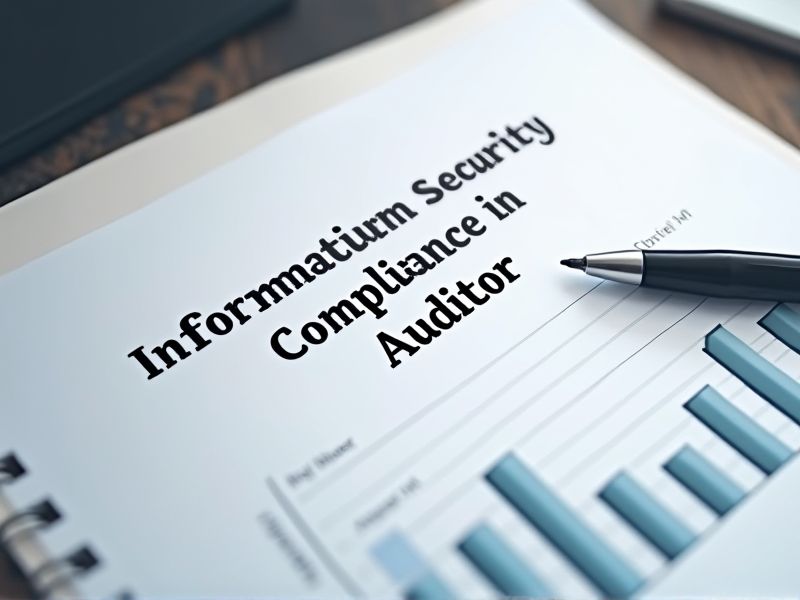
In the field of information security, regulatory standards and compliance frameworks are critical for protecting sensitive data and maintaining organizational integrity. Information Security Compliance Auditors are responsible for assessing and ensuring that companies adhere to these intricate standards, where having specific certifications signifies expertise and credibility. These certifications equip auditors with the necessary skills to evaluate security controls and recommend improvements effectively. Recognizing the need for specialized knowledge, here are some important certifications you may need for Information Security Compliance Auditor roles.
Certified Information Systems Auditor (CISA)
Organizations increasingly rely on CISA-certified professionals to ensure compliance with industry standards and regulatory requirements due to the complexities of modern information systems. The expertise gained from CISA certification enhances the ability to identify vulnerabilities, thereby reducing the risk of data breaches. CISA provides the foundational knowledge necessary for conducting thorough audits, which strengthens internal controls and organizational security posture. In the evolving landscape of cybersecurity threats, the CISA establishes trust and credibility in assessing and managing information system risks effectively.
Certified Information Security Manager (CISM)
Organizations increasingly face complex regulatory requirements, driving the need for Certified Information Security Managers (CISM) as Information Security Compliance Auditors. CISM certification imparts a deep understanding of risk management, ensuring auditors can effectively assess compliance. With a focus on governance and management, CISM-certified professionals can guide organizations in aligning security policies with compliance mandates. The rigorous training in information security strategy enabled by CISM provides auditors the expertise to identify gaps in compliance and recommend robust solutions.
Certified Information Systems Security Professional (CISSP)
CISSP provides a comprehensive understanding of the security landscape, which helps auditors identify compliance gaps effectively. The credential ensures auditors are equipped with the technical knowledge necessary to evaluate security protocols thoroughly. CISSP certification validates an auditor's ability to apply cybersecurity best practices, enhancing the credibility of their assessments. Organizations often mandate CISSP for auditors to align with industry standards and maintain a strong security posture.
Certified in Risk and Information Systems Control (CRISC)
Certifications like CRISC are crucial for Information Security Compliance Auditors because they demonstrate a deep understanding of risk management and control frameworks. Having CRISC-certified auditors ensures that they are equipped to assess and mitigate IT risks effectively, which is essential for maintaining compliance with regulatory standards. In-depth knowledge gained from CRISC certification helps auditors identify potential vulnerabilities and recommend robust measures to safeguard information systems. Organizations benefit from CRISC-certified professionals by enhancing their security posture and ensuring alignment with industry best practices.
ISO/IEC 27001 Lead Auditor
ISO/IEC 27001 Lead Auditors ensure that an organization's information security management system aligns with international standards, which reduces risk. Their expertise helps identify vulnerabilities and implement strategies to prevent data breaches. Auditors facilitate continuous improvement by conducting regular assessments and delivering actionable insights. Organizations achieve and maintain compliance, gaining trust from clients and stakeholders by leveraging their skills.
CompTIA Security+
CompTIA Security+ equips individuals with foundational knowledge in security protocols, which is essential for an Information Security Compliance Auditor to evaluate organizational adherence to security standards. A strong grasp of risk management and network security, as provided by the certification, enables auditors to identify and address vulnerabilities effectively. Understanding encryption and access control measures helps auditors ensure that companies are compliant with industry regulations. The certification also ensures that auditors can communicate technical security issues clearly to both technical teams and management.
GIAC Security Essentials (GSEC)
The GIAC Security Essentials (GSEC) certification provides foundational knowledge crucial for an Information Security Compliance Auditor to assess organizational security policies effectively. A strong understanding of access control, cryptographic standards, and network security helps auditors evaluate compliance with industry standards. Certification ensures auditors can identify gaps in security measures and recommend actionable improvements. Organizations benefit from auditors with GSEC certification as they possess validated technical skills necessary to audit various security protocols accurately.
Certified Ethical Hacker (CEH)
Information Security Compliance Auditors with a Certified Ethical Hacker (CEH) credential are better equipped to identify vulnerabilities because they have hands-on experience with hacking techniques. Such expertise enhances their ability to evaluate the effectiveness of security measures and ensure they meet industry standards. Organizations seeking compliance rely on these auditors to assess and improve their cyber defenses against real-world threats. The CEH certification provides auditors with the requisite skills to simulate potential attacks, which is crucial for a thorough security audit.
Certified Information Privacy Professional (CIPP)
Organizations face increasing data privacy regulations, prompting a need for Certified Information Privacy Professionals (CIPPs) in compliance roles. This certification equips auditors with knowledge on privacy laws and frameworks, enabling accurate assessment. Understanding privacy principles helps auditors identify non-compliance, thereby reducing potential legal risks. Employing a CIPP-certified auditor enhances trust with stakeholders and demonstrates commitment to data protection standards.
Certified Compliance and Ethics Professional (CCEP)
Having a Certified Compliance and Ethics Professional (CCEP) credential equips an Information Security Compliance Auditor with specialized knowledge of compliance frameworks and regulatory requirements. This expertise is essential for accurately identifying potential risks and ensures that the organization adheres to both ethical standards and legal mandates. The CCEP certification enhances the auditor's credibility and proficiency in implementing effective compliance programs and policies. With these skills, an auditor can better guide organizations in fostering a culture of integrity and compliance, reducing the risk of data breaches and other security threats.
Summary
When you obtain certifications as an Information Security Compliance Auditor, you boost your credibility in the field. This increased trust can lead to better job opportunities and career advancement. Organizations may regard you as more knowledgeable, enhancing their confidence in your ability to ensure their systems are secure and compliant. Lastly, your skills are validated, which can result in higher demand and potential salary increases.
